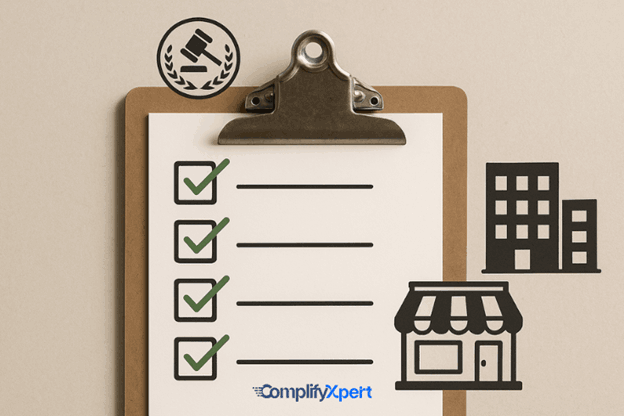Starting any business requires some legal steps. One important legal step in India is the Shop and Establishment Act registration. This applies to most businesses, from small shops to large offices. Every state has its own rules, but the main purpose is the same, which is to regulate working hours, employee rights, and workplace conditions.
This blog explains about the law, who needs to register, the benefits, the State-Wise Shop Act registration, and the full compliance checklist.
Table of Contents
What is the Shop and Establishment Act ?

The Shop and Establishment Act is a state-level labor law in India. It controls how shops, offices, and other businesses run. This law helps make sure that workers get fair compensation and benefits. It covers factors like working hours, rest times, holidays, wages, and safety.
Each state has its own version of the act with its own rules and regulations. For example, Maharashtra, Tamil Nadu, and Karnataka all follow this law, but the steps may differ. This act applies to all commercial establishments, including shops, restaurants, and service providers.
What is Shop and Establishment Act Registration ?

Shop and Establishment Act Registration is the official process to record your business under the local labor department. It serves as proof that your business complies with state labor laws.
After you register, you get a license that is known as a commercial establishment license. This license is a proof of legal business operations. Registration is usually done within 30 days of starting the business.
In most states, you can complete the shop act online registration using the state government’s labor department website.
Who Needs to Register ?

The law applies to most businesses that operate as a shop or office. You need to complete Shop and Establishment Registration Online if you run:
- A shop (grocery, garment, hardware, etc.)
- An office (IT company, consultancy, etc.)
- A service center (repair shop, beauty salon, etc.)
- A restaurant or hotel
- A theatre or place of public entertainment
- Warehouses and storage units
- Home-based businesses
Even small business owners, like freelancers or home-based service providers, may need to register if they hire workers. Registration is required whether your business has full-time or part-time workers.
Advantages of Shop and Establishment Registration

Getting your business registered under the Shop Act has many benefits. It helps your business stay within the law and gives more trust to your clients and vendors. Here are some main advantages:
- It gives your business legal proof of existence
- Helps when applying for loans or opening a bank account
- Assures that your workers receive fair treatment
- Helps avoid fines and legal trouble
- Useful while applying for other licenses like GST or trade license
- This license is often one of the first steps before applying for other approvals.
State-Wise Procedures for the Shop and Establishment Act
Every state in India has its own way of handling registration under this act. The process, fee, and documents for shop act registration may vary. Below are some major states:
| State | Name of the Act | Procedure |
| Maharashtra | Maharashtra Shops and Establishments Act, 2017 | Fully online |
| Aadhaar and PAN linked system | ||
| applies to all business types | ||
| Karnataka | Karnataka Shops and Commercial Establishments Act, 1961 | Registration via Seva Sindhu portal |
| auto-renewal every 5 years in some cases | ||
| Delhi | Delhi Shops and Establishments Act, 1954 | 100% online process |
| No physical documents required unless audited | ||
| Tamil Nadu | Tamil Nadu Shops and Establishments Act, 1947 | Registration is needed even for small businesses and freelancers |
| Telangana | Telangana Shops and Establishments Act, 1988 | Registration and renewal via the Telangana Labour portal |
| Andhra Pradesh | Andhra Pradesh Shops and Establishments Act, 1988 | Online registration is available via the Labour Department portal |
If you are unsure about your state’s process, you can visit the state labor department’s website or check with a legal expert for the state-wise shop act process.
Shop and Establishment Act Compliance Checklist

Once you register under the act, you must follow certain rules. These are checked during inspections and must be kept up-to-date. Below is a simple compliance under Shop Act checklist to follow:
- Finding out whether the business falls within the purview of the Act.
- Retaining registration within 30 days of the opening of business.
- Periodic notification within a reasonable time of any change to the inspection.
- Adherence to prescribed opening hours, rest intervals, and weekly holidays.
- Compliance with legal standards relating to leave periods and wage payment.
- Compliance with regulations prescribed for health and safety standards.
- Payment of overtime compensation on time.
- Maintenance of cleanliness, lighting, ventilation, and provision of facilities required.
- Compliance with the rules for terminating employees.
- Filing an intimation application when employing less than 10 workers.
- Proper maintenance of the employees and wage registers.
- Ensures timely payment of bonuses to eligible women.
- Submission of requisite change to the Inspector, if any
To Conclude
If you run any kind of shop, office, or service business, getting a Shop and Establishment Act registration is one of the first steps. It shows that you follow basic labor rules and protects both your workers and your business. Every state has a different process, but registration is often simple and available online.
Ensure that you are in complete compliance under Shop Act and renew your license when due. A shop license in India, registration, or periodical check-ups notwithstanding, compliance enables you to expand your business easily.


